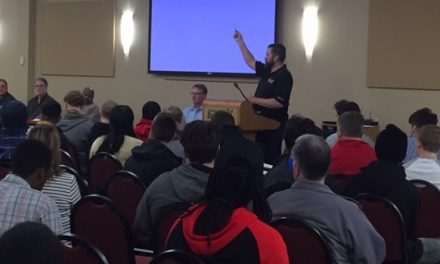On Jan. 15, ACT Ohio Executive Director Matthew Szollosi testified before the Ohio Senate Commerce and Labor Committee. He was there to inform and explain to the legislators that ACT Ohio strongly supports Substitute Senate Bill 78 (Sub. S.B. 78).
The proposed legislation would make a number of improvements to the existing state law that regulates specialty construction contractors.
Here’s a copy of Szollosi’s testimony:
MEMORANDUM
To: Ohio Senate Commerce and Labor Committee
From: Matthew Szollosi, Executive Director – Affiliated Construction Trades of Ohio
Date: January 15, 2014
Re: Testimony in Support of Sub. S.B. 78
Chairman Bacon / Vice-Chair Eklund / Ranking Member Brown:
Please be advised that ACT Ohio is a 501(c)(5) organization created to encourage economic and industrial development opportunities, and to facilitate utilization of industry-best practices for Ohio’s public and private construction. For the reasons that follow, ACT Ohio urges passage of Sub. S.B. 78.
Current law requires contractors in the fields of HVAC, refrigeration, electrical, plumbing or hydronics to obtain a license as issued by the Ohio Construction Industry Licensing Board.
The Board itself falls within the Department of Commerce and has 17 members, all appointed by the Director of the Department of Commerce. There is an Administrative Section, a Plumbing and Hydronics Section, an HVAC Section, and an Electrical Section. The three latter “trade specific” sections are comprised of 5 members – 2 employer representatives, 2 labor representatives, and a trade-specific inspector for the respective craft or Section.
The Administrative Section of the OCILB schedules, administers and scores the examinations; handles the fees; issues and renews the licenses; keeps the records, etc. (R.C. 4740.04). To qualify to take an exam, an individual must be (i) 18 years or older; (ii) a U.S. citizen/legal resident of the U.S.; (iii) 5 years experience in the trade; (iv) maintain contractor’s liability insurance; (v) not been convicted or plead guilty to a crime of moral turpitude, including engaging in fraud, misrepresentation or deception in the conduct of business.
The trade specific Sections of the OCILB makes determinations on: reciprocity with other states; fees for licensure and renewal; criteria for qualifications necessary for license; criteria for continuing education requirements. The trade specific sections are also charged with the responsibility to investigate allegations of violations and to establish and conduct hearings on said findings. Upon the affirmative vote of 4 of its 5 members, a Section may impose the disciplinary measures set forth in R.C. 4740.10, which include: fines/penalties, suspension or revocation of license.
Generally, our organization advocates for strong licensing regulations. Our industry invests heavily in apprenticeship training, safety training, and journeyman skill/upgrade training. Licensing certifications such as those at issue here raise the bar on the quality of construction occurring in the State of Ohio, and help promote the health and welfare of the public.
Our interest in the bill can be narrowed in large part to the modifications concerning unlicensed contracting. There are simply too many instances of licensed contractors pulling permits for unlicensed individuals or contractors, typically for an up-front fee. This tactic completely undermines the OCILB and the goals of the Code.
In the construction industry, safety is paramount. The law was established to help ensure the safety of those doing the work, other workers that may be working in the vicinity of the licensed work, as well as those that come into proximity of the service area after work is completed. These licensing requirements are in place to ensure that those contractors engaging in these specialized fields meet minimum standards or qualifications. These standards are meant to minimize the number of unqualified individuals engaging in these areas that could cause serious harm to themselves or others. When these standards are dodged, the risk already associated with construction, an ultra-hazardous industry by any measurable methodology, is greatly increased, oftentimes resulting in bodily harm and financial loss.
Simply put, these changes will likely result in significantly reduced instances of unlicensed work being done across the state.
Accordingly, ACT Ohio strongly supports Sub. S.B. 78.



